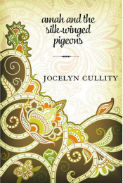
 |
Mistaken for a boy in her royal uniform trousers, Amah is a female bodyguard assigned to protect possessions of the king of Lucknow. The greediness of the British forces the king’s exile to Calcutta. English soldiers plan to take over the great wealth of the Awadh region of India—a wealth generated from trading spices and tea with the East India Company to satisfy Englishmen’s tastes.
Amah’s noble Ethiopian heritage is from Sufi relatives who arrived in the 14th century. Sufi Islam seeks mystical and personal experience. Over years they supported the genteel culture surrounding Lucknow royalty. Care for all animals and plants is symbolized by the book’s title. Pigeons (green silk-winged) are raised to fly overhead and shade royal conveyances moving through sweltering compounds.
The remnant in Lucknow is without direction from the exiled king or even the queen mother, who is in England pleading for her son. Begam Sahiba, a former queen, reluctantly rallies supporters around her young son, Birjis. The English barricade themselves inside the Residency while Begam Sahiba only seeks their surrender. Both sides know the difference between good and evil. Fear of a deadly uprising, sparks over-reaction.
Amah is the chief protagonist, and the English ‘Red Man’ is her antagonist throughout the book. The tale culminates with a resolution between them. Other British officers ride in and out of Lucknow history. Their mistakes cause Queen Victoria to disband the trading company and assume direct British rule.
This historical novel is amazingly detailed and is doubtlessly enhanced through the author’s sharing of her personal heritage. The inclusion of a map of Old Lucknow is very helpful. Lists of main characters and explanations of Indian terms are genuine gifts from the author to her reader.